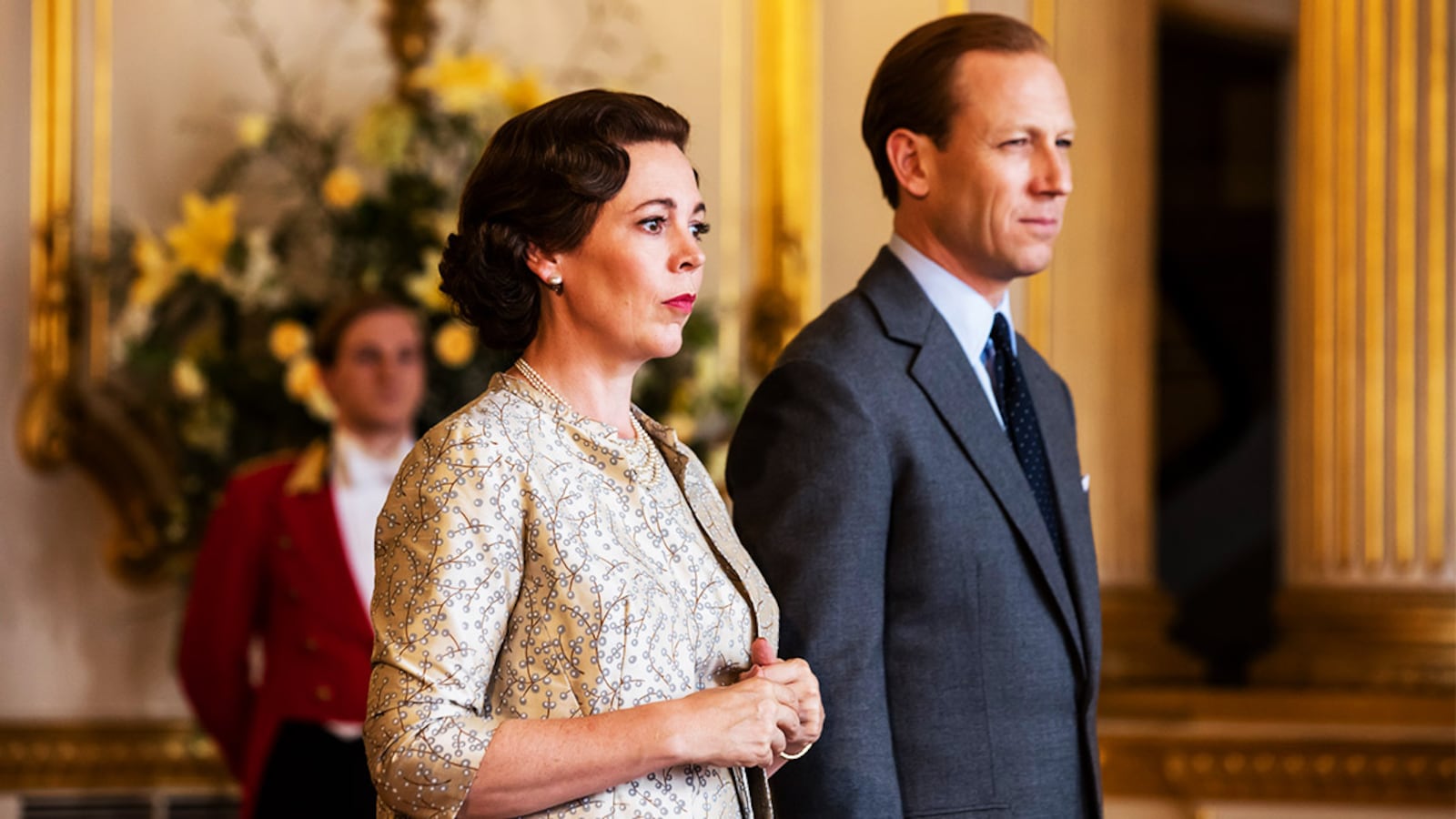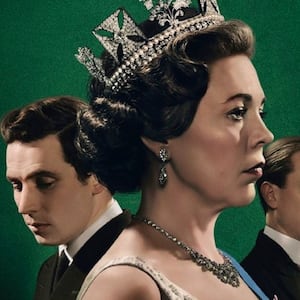Did the Queen and Prince Philip ever take a moment to look at their children and wonder, “how did we mess up so much?”
Unlikely with Philip, not inclined to self-reflection. The Queen? Maybe.
Whatever the truth, this is a question you’ll probably be asking yourself as the third season of The Crown unspools on Netflix… and the fourth, and the fifth…
Quite a bit of the forthcoming action in the royal family can be attributed to the Windsor record in parenting. We’ve already seen how Prince Charles was dispatched to the penitential horrors of the Spartan academy of Gordonstoun in Scotland, which Charles himself memorialized as “Colditz in kilts.”
This is, after all, not a model family when it comes to life outcomes: three of the four kids were destined to have marriages that ended in divorce, a precipitate change in royal fashion and custom since there hadn’t been a divorce in the family since 1901.
When the new season begins there has been a significant change behind the scenes in the royal nursery, where the two youngest princes, Andrew and Edward, are being raised.
Charles and his sister Anne had suffered at the hands of their principal nanny, Helen Lightbody, an unrelenting Victorian taskmaster to whom the Queen had left much of the early character development of her first two children.
Nannies were often problematic at the palace. Elizabeth and her sister Margaret’s own nannie, Marion Crawford, known as “Crawfie,” had been popular with the two princesses, a stalwart throughout the war and regarded as almost a member of the family.
But in 1949 she shocked them and disgraced herself in their eyes by writing her memoirs. It was an anodyne and adoring account but it violated the sacred rule that nobody should cash in on their service with the family.
Unfortunately for Charles and Anne, Crawford was followed by Lightbody, a case of applying a severe over-corrective. Belatedly the Queen and Philip realized that there was no light touch with Lightbody.
Philip was especially annoyed that she favored Charles over Anne; Charles was submissive with his nanny while Anne was rebellious. Philip—seeing something of himself in Anne—wanted to release his daughter from the tyrant of the nursery and Lightbody departed, replaced by a much younger and more tolerant nanny, Mabel Anderson.
And here was the key clue to Philip’s entire record as a father: his belief in gender stereotypes. Charles was the first and most serious casualty of the doctrine that he should be as macho as his father. As we have seen, he was never able to be that person because it wasn’t who he was.
Philip’s policy was clear and adamantine. He said, “School is expected to be a Spartan and disciplined experience in the process of developing into self-controlled, considerate, and independent adults.”
Judging by how this doctrine had turned out in Philip himself the “considerate” element was fungible. He wasn’t at all prepared to consider that the heir to the throne might not be suited to join the Spartans—Charles was, to anyone who took the trouble to notice, far more Athenian in character.
Philip repeated the same mistake with his youngest son, Edward. Again, he was sent to Gordonstoun, where he was a poor student academically but bore the physical rigors more readily than Charles. (Andrew, who preceded Edward at Gordonstoun, turned out to be the most suited of the three sons to its regime, thriving both academically and physically. Not that that has turned out well, since he has the cupidity and lusts of a Russian oligarch.)
Even though Edward’s grades were far below what was normally required to get into Cambridge University, he was given a place there. A substantial part of his tuition fees was provided by the Royal Marines on the condition that after Cambridge he became a Marine commando. (Just exactly why Edward would need outside funding is a mystery.)
Edward joined the Marines in 1986 and the result was humiliating: He dropped out after completing only one third of the training course. Philip’s response was splenetic, and Edward wept. Since then, as the Earl of Wessex, he has become the least visible of the royal children, his life being too dull to attract the tabloids.
Meanwhile Anne, as the Princess Royal, has become the hardest-working member of the family, tirelessly supporting good causes. She had a racy youth (as will be seen in The Crown) and a failed marriage before finding true love with Timothy Laurence, a naval officer who was equerry to her mother.
And so any audit of royal parenting comes back to the same problem: the Queen ceded control of her children’s upbringing to Philip and Philip had an inflexible view of what form that should take, particularly for his sons.
Where was this view formed?
Philip’ parents were Prince Andrew and Princess Alice of Greece, but the Greek monarchy had shallow roots and in the 1920s the royal family went into exile. His feckless father took off for Monte Carlo with a mistress while his mother lived in Paris, where Philip attended the American School in St. Cloud.
Philip arrived in England in 1930 at the age of 9 and was put in the care of the Mountbatten branch of the royal family, going to live with George, the Marquis of Milford Haven, and his wife Nadejda, whose family seat was Lynden Manor, a sprawling estate west of London. They funded Philip’s upbringing. They had an 11-year-old son David who quickly became Philip’s best friend—they became known as “the Mountbatten boys.”
(Unknown to the boys, George Milford Haven had a clandestine hobby: he collected pornographic books and erotica. He carefully compiled a huge index ranging over books and photographic albums devoted to sadomasochism, incest and bestiality.)
Philip and David went to Cheam, the oldest private school in England, where fewer than 50 boys boarded in a converted Georgian farmhouse—Charles was later to follow his father to Cheam.
This happy and adventurous life in the lushest of the English shires ended in 1933 when Philip was sent to a school in Germany called Salem, run by Kurt Hahn, on lines very different to Cheam.
Hahn promoted a new “progressive” educational regime in which tests of exacting physical endurance ranked equally with academic attainment. But Hitler came to power in 1933 and Hahn was a Jew and in 1934 he fled to Scotland, where on the North Sea coast he founded Gordonstoun, and Philip followed him there.
Philip did so well at Gordonstoun that he became head boy. Hahn reported: “He was one of those boys who very early rendered disinterested service and who never asked for any privilege on account of his birth.”
Philip was a “born leader” who nevertheless needed “the exacting demands of a great service to do justice to himself” although his virtues were “marred at times by impatience and intolerance.”
The ultimate overseer of Philip’s youth was the head of the Mountbatten clan, Earl “Dickie” Mountbatten, with louche tastes rather like his brother the Marquis. (Just how louche has recently come to light in a biography by Andrew Lownie, alleging, among other traits, serial pederasty.)
Philip had emerged as exactly the kind of handsome man of action that Mountbatten had intended him to be—and particularly one of the most eligible bachelors of his generation.
Virtually by Mountbatten’s design, Philip married the princess who would be Queen. Philip, as it turned out, believed with total conviction that the process that had transformed him from being, as he once put it, a “refugee prince” into the very model of a British prince and royal consort was also the right process to make real men of his own sons.







